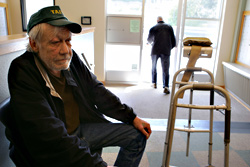One of the city’s longtime homeless-shelter providers is likely to have city funding cut, possibly leaving about 300 homeless people without a place to sleep, because of a dispute over data required by the city under King County’s nascent 10-year plan to end homelessness. The provider, SHARE/WHEEL, which organizes the roving Tent City program, is threatening to retaliate by opening three more homeless encampments in Seattle if it loses $227,000 in city funding next March. Besides running tent cities of up to 100 residents each in Seattle and on the Eastside, the group houses about 300 people a night at 14 small shelters throughout the city, many located at churches.
The dispute arose because the city and King County will require homeless service providers to enter client data into a computerized system called Safe Harbors. SHARE/WHEEL stands for Seattle Housing and Resource Efforts and Women’s Housing, Equality, and Enhancement League. Organizers decline to speak for attribution, but they oppose personal-data collection on principle. In their mind, asking homeless people to provide name, age, and race, for example, is discriminatory, multiplying the stigma of homelessness.
But Patricia McInturff, the city’s Human Services Department director, says that every other provider in the city is going to comply with the data requirement, and that collecting such data is a crucial piece in combating homelessness. “We can’t end homelessness unless we understand who is homeless and what works” to end homelessness, she says. Under the 10-year plan, the service emphasis is to shift from getting King County’s estimated 8,000 homeless off the streets one night at a time to getting them off the streets for a lifetime, by offering long-term housing and connecting them with an array of social services. Personal identifiers, McInturff says, will be stripped from the data once it hits the city’s computers. “If we could do it for AIDS patients, we can do it here,” she says.
Which providers get what slice of the city’s $5 million for shelter beds in 2006 will not be announced until late November. SHARE/WHEEL won’t be among them, says McInturff, because they won’t comply with the data requirement. She and Alan Painter, the agency’s acting deputy director, say they tried to work with SHARE/WHEEL to find a way to accommodate them, but the group was steadfast. They add that any lost shelter beds from SHARE/WHEEL will be made up by other providers.
It’s not likely that the group, one of the oldest continuously operating peer-run homeless organizations in the country, will find willing ears on the City Council, if it takes the issue there. “I don’t understand their thinking,” says City Council member Tom Rasmussen, chair of the council’s Human Services Committee. “How is this the best service for the people they are working for? Who is benefiting from that?”







